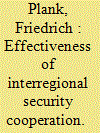| Srl | Item |
| 1 |
ID:
155692


|
|
|
|
|
| Summary/Abstract |
African Union (AU)–European Union (EU) interregional security cooperation has not so far been analysed systematically with regard to its effectiveness despite the substantial support of African capacity building by the EU and joint peacekeeping of the partners. Assessing AU–EU cooperation in the Central African Republic (CAR), this paper examines to what extent and under which conditions EU–AU efforts are effective. Concerning the dependent variable, the presented conceptualisation of effectiveness includes both internal (goal attainment) and external (problem-solving) perspectives. The independent variable draws on two strands of literature that barely speak to each other: interregionalism and inter-organisationalism. It focuses on the conditions of effectiveness which include both internal (RO-specific) and interregional factors. The findings suggest that AU–EU engagement in the CAR was effective in the medium term. Strong incentives of the partners, the French leading role and the convergence of the partners are identified as factors conducive to a medium to high effectiveness of the engagement.
|
|
|
|
|
|
|
|
|
|
|
|
|
|
|
|
| 2 |
ID:
137167


|
|
|
|
|
| Summary/Abstract |
The narrative of an aggressive and neo-imperialist Russia that has dominated analyses of the 2014 Ukrainian crisis lacks theoretical rigour. We argue that a sustainable transformation of the Ukrainian crisis requires an accurate analysis of the context of the conflict, which should include an understanding of Moscow’s perception of the threats to its interests. This policy brief develops a theoretical understanding of the Ukrainian crisis through the lens of Stephen M. Walt’s balance of threat theory. We conclude that a realist analysis will help to explain Russian actions.
|
|
|
|
|
|
|
|
|
|
|
|
|
|
|
|
| 3 |
ID:
140776


|
|
|
|
|
| Summary/Abstract |
Civil wars frequently end with the signature of a peace agreement, which often includes power-sharing provisions. While most research focuses on their provisions, little research has been done on the question of how the content of peace agreements affects the groups signing them. Instead, research commonly depicts the conflict parties as unitary actors. This study tries to fill this research gap by asking how the content and implementation of the Mindanao Final Agreement affected the cohesion of the Moro National Liberation Front (MNLF). The analysis concludes that the implementation of power sharing is decisive. The failed inclusion and the low implementation of economic and territorial provisions had major effects on the cohesion of the MNLF.
|
|
|
|
|
|
|
|
|
|
|
|
|
|
|
|
| 4 |
ID:
155681


|
|
|
|
|
| Summary/Abstract |
While research has already focused on power-sharing agreements by assessing specific effects of political, economic, territorial and military provisions, some provisions might be more important than others. This paper argues that the content of an agreement is crucial for the cohesion of a signatory rebel group since these are strongly affected by resource-distribution and the way in which the underlying conflict is managed. Investigating on the Free Aceh Movement and the Moro National Liberation Front, this study concludes that the implementation of power-sharing is decisive. When inner-core provisions and single factions are addressed, groups tend to stay united.
|
|
|
|
|
|
|
|
|
|
|
|
|
|
|
|